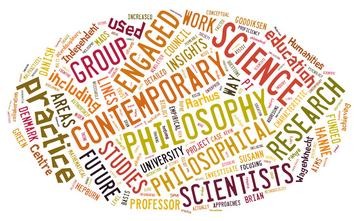
Philosophy of Contemporary Science in Practice is a project led by Hanne Andersen, professor at the Centre for Science Studies, Aarhus University, Denmark. Further group members at present are Susann Wagenknecht, Sara Green, Mads Goddiksen and Brian Hepburn.
Philosophy of Contemporary Science in Practice aims at achieving a detailed understanding of characteristic changes in contemporary science and their implications for the future development of science. Our group conducts case studies that investigate contemporary science on an empirical basis, focusing on a range of topics including the increased mathematical embedding and use of engineering approaches in areas of contemporary biology, explanatory practices in nanoscience education, trust and testimonial practices in collaboration among scientists on a group level, authorship practices, exploratory experimentation, conceptual development in interdisciplinary research, and scientific misconduct and other malpractices in science. Hence, some of our work is engaged with the practices of how science is actually done, and some of our work is engaged with philosophical problems in the sciences – and some of it is engaged with both at the same time. In that way our work is much in line with John Dupré’s notions of philosophy-of-science in practice and philosophy of science-in-practice (SPSP Newsletter, February 2012). But we would widen the description of philosophy-of-science in practice and include not only how philosophical insights can be used to assist also policy makers and citizens in addressing science related questions, but also how philosophical insights can be used in the education of future scientists to enhance scientific proficiency.
We see science a multi-faceted enterprise that can vary considerably from one area of inquiry to the next. We therefore also think that philosophy of science-in-practice needs to draw on many methodologies, not only from philosophy but also from history, sociology, psychology and the cognitive sciences. Hence, although the demarcation lines between philosophy of science-in-practice and the many other modes of studying science may not dissolve, they do become more permeable/less rigid. In the same way, if philosophy-of-science in practice is seen not only as engagement with scientific research through interaction with scientists about philosophical problems in the sciences, but also as engagement with the application of scientific research in society or the training of future scientists, it will necessarily have close relations to neighboring disciplines such as science education.
The project is funded by the Danish Research Council / Humanities for the period 2010 - 2014.